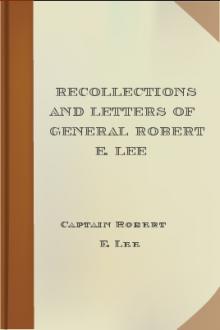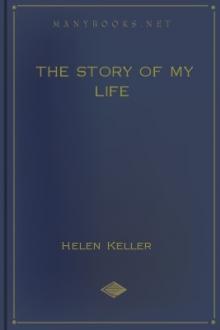Recollections and Letters of General Robert E. Lee by Captain Robert E. Lee (howl and other poems .txt) 📕

- Author: Captain Robert E. Lee
- Performer: -
Book online «Recollections and Letters of General Robert E. Lee by Captain Robert E. Lee (howl and other poems .txt) 📕». Author Captain Robert E. Lee
“R. E. Lee.”
The dreary winter gradually passed away. Toward the last of April, the two armies, which had been opposite each other for four months, began to move, and, about the first of May, the greatest of Lee’s battles was fought. My command was on the extreme left, and, as Hooker crossed the river, we followed a raiding party of the enemy’s cavalry over toward the James River above Richmond; so I did not see my father at any time during the several day’s fighting. The joy of our victory at Chancellorsville was saddened by the death of “Stonewall” Jackson.
His loss was the heaviest blow the Army of Northern Virginia ever sustained. To Jackson’s note telling him he was wounded, my father replied:
“I cannot express my regret at the occurance. Could I have directed events, I should have chosen for the good of the country to have been disabled in your stead. I congratulate you on the victory, which is due to your skill and energy.”
Jackson said, when this was read to him, “Better that ten Jacksons should fall than one Lee.”
Afterward, when it was reported that Jackson was doing well, General Lee playfully sent him word:
“You are better off than I am, for while you have only lost your LEFT, I have lost my RIGHT arm.”
Then, hearing that he was worse, he said: “Tell him that I am praying for him as I believe I have never prayed for myself.”
After his death, General Lee writes to my mother, on May 11th: “…In addition to the deaths of officers and friends consequent upon the late battles, you will see that we have to mourn the loss of the great and good Jackson. Any victory would be dear at such a price.
His remains go to Richmond to-day. I know not how to replace him.
God’s will be done! I trust He will raise up some one in his place….”
Jones, in his Memoirs, says: “To one of his officers, after Jackson’s death, he [General Lee] said: ‘I had such implicit confidence in Jackson’s skill and energy that I never troubled myself to give him detailed instructions. The most general suggestions were all that he needed.’”
To one of his aides, who came to his tent, April 29th, to inform him that the enemy had crossed the Rappahannock River in heavy force, General Lee made the playful reply:
“Well, I heard firing, and I was beginning to think it was time some of you lazy young fellows were coming to tell me what it was all about.
Say to General Jackson that he knows just as well what to do with the enemy as I do.”
Jackson said of Lee, when it was intimated by some, at the time he first took command, that he was slow:
“He is cautious. He ought to be. But he is NOT slow. Lee is a phenomenon. He is the only man whom I would follow blindfold.”
As the story of these great men year by year is made plainer to the world, their love, trust, and respect for each other will be better understood. As commander and lieutenant they were exactly suited.
When General Lee wanted a movement made and gave Jackson an outline of his plans and the object to be gained, it was performed promptly, well, and thoroughly, if it was possible for flesh and blood to do it.
At the end of May, the Army of Northern Virginia, rested and strengthened, was ready for active operations. On May 31st General Lee writes to Mrs. Lee:
“…General Hooker has been very daring this past week, and quite active. He has not said what he intends to do, but is giving out by his movements that he designs crossing the Rappahannock. I hope we may be able to frustrate his plans, in part, if not in whole…. I pray that our merciful Father in Heaven may protect and direct us!
In that case, I fear no odds and no numbers.”
About June 5th most of the army was gathered around Culpeper. Its efficiency, confidence, and MORALE were never better. On June 7th the entire cavalry corps was reviewed on the plain near Brandy Station in Culpeper by General Lee. We had been preparing ourselves for this event for some days, cleaning, mending and polishing, and I remember were very proud of our appearance. In fact, it was a grand sight—
about eight thousand well-mounted men riding by their beloved commander, first passing by him in a walk and then a trot. He writes to my mother next day—June 8, 1863:
“…I reviewed the cavalry in this section yesterday. It was a splendid sight. The men and horses looked well. They have recuperated since last fall. Stuart [J. E. B. Stuart, commanding cavalry corps.] was in all his glory. Your sons and nephews [two sons and three nephews]
were well and flourishing. The country here looks very green and pretty, notwithstanding the ravages of war. What a beautiful world God, in His loving kindness to His creatures, has given us! What a shame that men endowed with reason and knowledge of right should mar His gifts….”
The next day, June 9th, a large force of the enemy’s cavalry, supported by infantry, crossed the Rappahannock and attacked General Stuart.
The conflict lasted until dark, when
“The enemy was compelled to recross the river, with heavy loss, leaving about five hundred prisoners, three pieces of artillery, and several colours in our hands.”
During the engagement, about 3 P. M., my brother, General W. H. F. Lee, my commanding officer, was severely wounded. In a letter dated the 11th of the month, my father writes to my mother: “…My supplications continue to ascend for you, my children, and my country. When I last wrote I did not suppose that Fitzhugh would be soon sent to the rear disabled, and I hope it will be for a short time.
I saw him the night after the battle—indeed, met him on the field as they were bringing him from the front. He is young and healthy, and I trust will soon be up again. He seemed to be more concerned about his brave men and officers, who had fallen in the battle, than about himself….”
It was decided, the next day, to send my brother to “Hickory Hill,”
the home of Mr. W. F. Wickham, in Hanover County, about twenty miles from Richmond, and I was put in charge of him to take him there and to be with him until his wound should heal. Thus it happened that I did not meet my father again until after Gettysburg had been fought, and the army had recrossed into Virginia, almost to the same place I had left it. My father wrote my brother a note the morning after he was wounded, before he left Culpeper. It shows his consideration and tenderness:
“My Dear Son: I send you a dispatch, received from C. last night.
I hope you are comfortable this morning. I wish I could see you, but I cannot. Take care of yourself, and make haste and get well and return. Though I scarcely ever saw you, it was a great comfort to know that you were near and with me. I could think of you and hope to see you. May we yet meet in peace and happiness….”
In a letter to my brother’s wife, written on the 11th, his love and concern for both of them are plainly shown: “I am so grieved, my dear daughter, to send Fitzhugh to you wounded.
But I am so grateful that his wound is of a character to give us full hope of a speedy recovery. With his youth and strength to aid him, and your tender care to nurse him, I trust he will soon be well again.
I know that you will unite with me in thanks to Almighty God, who has so often sheltered him in the hour of danger, for his recent deliverance, and lift up your whole heart in praise to Him for sparing a life so dear to us, while enabling him to do his duty in the station in which he had placed him. Ask him to join us in supplication that He may always cover him with the shadow of His almighty arm, and teach him that his only refuge is in Him, the greatness of whose mercy reacheth unto the heavens, and His truth unto the clouds. As some good is always mixed with the evil in this world, you will now have him with you for a time, and I shall look to you to cure him soon and send him back to me….”
My brother reached “Hickory Hill” quite comfortably, and his wound commenced to heal finely. His wife joined him, my mother and sisters came up from Richmond, and he had all the tender care he could wish.
He occupied “the office” in the yard, while I slept in the room adjoining and became quite an expert nurse. About two weeks after our arrival, one lovely morning as we all came out from the breakfast table, stepping into the front porch with Mrs. Wickham, we were much surprised to hear to or three shots down in the direction of the outer gate, where there was a large grove of hickory trees. Mrs. Wickham said some one must be after her squirrels, as there were many in those woods and she asked me to run down and stop whoever was shooting them. I got my hat, and at once started off to do her bidding. I had not gone over a hundred yards toward the grove, when I saw, coming up at a gallop to the gate I was making for, five or six Federal cavalrymen.
I knew what it meant at once, so I rushed back to the office and told my brother. He immediately understood the situation and directed me to get away—said I could do no good by staying, that the soldiers could not and would not hurt him, and there was nothing to be gained by my falling into their hands; but that, on the contrary, I might do a great deal of good by eluding them, making my way to “North Wales,”
a plantation across the Pamunkey River, and saving our horses.
So I ran out, got over the fence and behind a thick hedge, just as I heard the tramp and clank of quite a body of troopers riding up. Behind this hedge I crept along until I reached a body of woods, were I was perfectly safe. From a hill near by I ascertained that there was a large raiding party of Federal cavalry in the main road, and the heavy smoke ascending from the Court House, about three miles away, told me that they were burning the railroad buildings at that place. After waiting until I thought the coast was clear, I worked my way very cautiously back to the vicinity of the house to find out what was going on. Fortunately, I took advantage of the luxuriant shrubbery in the old garden at the rear of the house, and when I looked out from the last box bush that screened me, about twenty yards from the back porch, I perceived that I was too soon, for there were standing, sitting and walking about quite a number of the bluecoats. I jumped back behind





Comments (0)